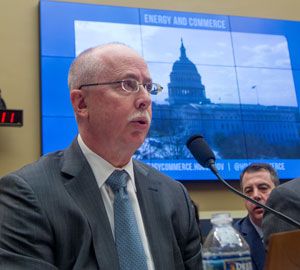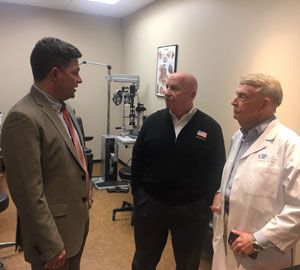Fighting for Laws and Policies That Help You Serve Your Patients and the Profession

2018 Academy President-Elect George A. Williams, MD, testified before the U.S. House of Representatives Energy and Commerce Committee Subcommittee on Health about the need for timely access to compounded treatments.
The Academy is a leader in Washington, D.C., and states nationwide in the push to advance laws and policies that support the profession of ophthalmology. Efforts undertaken by the Academy’s community of U.S. ophthalmologists ensure that high-quality medical and surgical eye care is available and sustainable in every community.
Preventing potentially devastating changes to E/M reimbursements
In a major win for the Academy on behalf of all ophthalmologists, the Centers for Medicare and Medicaid Services (CMS) is making changes to how evaluation and management (E/M) is reimbursed.
The Academy worked tirelessly to nudge CMS away from a proposal that would have significantly reduced E/M payments in 2019 along with payments for procedures that ophthalmologists provide on the same day as an office visit. After working within a broad coalition, the Academy successfully convinced CMS to instead adopt commonsense changes to E/M documentation requirements. Those that most affect ophthalmology include eliminating duplicative chief complaint and history information that has already been entered by clinical staff or the patient.
Additionally, there will be no E/M code collapse until 2021. This is CMS’ tacit acknowledgment that it should take more time to adjust this administrative change. By securing these changes to CMS policy, the Academy helped deliver a significant improvement over the proposed system by educating the Trump administration and key members of Congress on the impact the proposal would have on patient care. These changes also help avoid a possible two-percent pay cut to our profession’s subspecialties.
Leading the push for accessible drugs
Over the past year, the Academy has taken bold, proactive steps to develop and support policies that shield our patients from sudden cost spikes. We’re similarly active in sounding the alarm about worrisome nationwide shortages for ophthalmic drugs, including fluorescein strips. In direct response to our efforts, the Food and Drug Administration convened a drug-shortage task force to address this and other scarcities. The Academy also strives to sway the Trump administration from what we believe is a legally dubious plan to allow step therapy in Medicare. This policy took effect on Jan. 1, 2019, enabling Medicare Advantage plans to introduce fail-first therapy for its beneficiaries. The Academy and other organizations throughout medicine continue to believe there are two prevailing reasons why CMS’ step therapy policy may run afoul with statute. First, CMS does not have the authority to grant Medicare Advantage plans the ability to limit coverage for Part B drugs. Second, we believe that the plan interferes with beneficiaries’ access to the same services provided under original Medicare, which is inappropriate.

Ophthalmologist Aaron M. Miller, MD (left), hosted Rep. Kevin Brady, R-Texas (center), at his practice in Houston to help advance the Academy’s federal advocacy priorities.
The Academy, along with a new step-therapy coalition including rheumatology, the American Society of Retina Specialists and the American Society of Cataract and Refractive Surgery, revealed to CMS the findings of an independent legal review that indicates that the agency and its Medicare Advantage program are at risk of litigation.
Pushing back against prior-authorization abuses
The Academy is seeking the immediate end of prior-authorization abuses that delay critical care for our patients with Medicare Advantage coverage. To do so, we’ve built a strong coalition that spans medical specialty societies and patient advocates. With this strength in numbers, we’re meeting regularly with Medicare’s top officials to educate them on the profound effect on patients who receive regular injections to preserve vision, as well as infusion treatments for crippling conditions.
Securing federal funding for important research and access-to-care programs
Although the private sector and universities can help promote some advances in our profession, it’s the federal government’s capacity for funding independent investigations that must be cultivated and shepherded through each year’s budget cycle.
As a result of ongoing Academy advocacy, the National Eye Institute received an additional $24.2 million in 2018 over the previous year to help advance important vision research. Congress and President Trump also increased the Department of Defense’s vision research program by $5 million. The National Institutes of Health gained an extra $2 billion as well, some of which will support vision-related programs, including investigations into traumatic brain injuries.
The Academy also facilitated the Indian Health Service’s improvements to its technology for expanded access to diabetic retinopathy screenings. Following months of intensive lobbying, Congress authorized $1 million to upgrade the agency’s retinal cameras. The program — known as the Joslin Vision Network Teleophthalmology Program — helps reach underserved Native American populations, which have high rates of diabetic retinopathy. This considerable Academy achievement results from relentless staff engagement with members of Congress who helped champion the issue.
OPHTHPAC: helping ophthalmologists navigate the halls of Congress
OPHTHPAC®, the Academy’s federal political action committee, was critical in keeping ophthalmology’s friends seated in Congress in 2018. Ninety percent of OPHTHPAC-supported candidates were victorious in their races during the November midterms. These results give the Academy a running start as we seek to build meaningful relationships with Congress’ newest lawmakers in 2019. Give ophthalmology new opportunities to impact federal policies by making an OPHTHPAC contribution today. Visit aao.org/ophthpac or text MDEYE to 41444.
Surgical scope fund: supporting your commitment to surgery by surgeons
With help from the Academy’s Surgical Scope Fund, ophthalmologists in eight states succeeded in their efforts to preserve high surgical standards.
These results show the profound impact of Surgical Scope Fund-sponsored resources and staff support in these challenging battles. Even when state societies are upstaged by optometry in terms of money and political clout, the Surgical Scope Fund helps our profession defy the odds when surgery by surgeons is under attack.
The Academy anticipates that as many as 30 states will face optometric surgical scope challenges in 2019. It is therefore paramount that we work to strengthen the Surgical Scope Fund as an extension of our calling to protect sight.
Become a champion for patient safety today by making a minimum Surgical Scope Fund contribution of $500. You’ll be giving threatened states the critical resources they need to preserve high surgical standards.